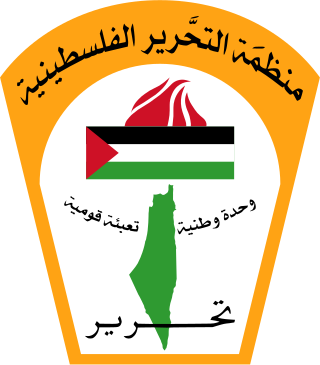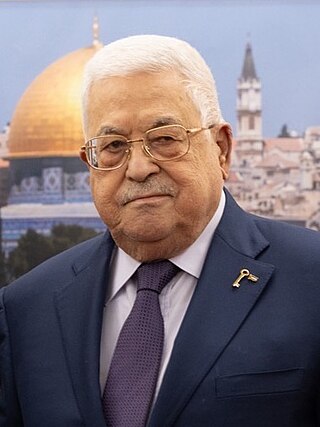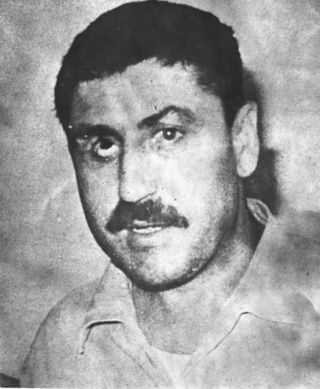
Fatah, formally the Palestinian National Liberation Movement, is a Palestinian nationalist and social democratic political party. It is the largest faction of the confederated multi-party Palestine Liberation Organization (PLO) and the second-largest party in the Palestinian Legislative Council (PLC). Mahmoud Abbas, the President of the Palestinian Authority, is the chairman of Fatah.

The Palestine Liberation Organization is a Palestinian nationalist coalition that is internationally recognized as the official representative of the Palestinian people; i.e. the globally dispersed population, not just those in the Palestinian territories who are represented by the Palestinian Authority. Founded in 1964, it initially sought to establish an Arab state over the entire territory of the former Mandatory Palestine, advocating the elimination of the State of Israel. However, in 1993, the PLO recognized Israeli sovereignty with the Oslo I Accord, and now only seeks Arab statehood in the Palestinian territories that have been militarily occupied by Israel since the 1967 Arab–Israeli War.

Yasser Arafat, also popularly known by his kunya Abu Ammar, was a Palestinian political leader. He was chairman of the Palestine Liberation Organization (PLO) from 1969 to 2004 and president of the Palestinian National Authority (PNA) from 1994 to 2004. Ideologically an Arab nationalist and a socialist, Arafat was a founding member of the Fatah political party, which he led from 1959 until 2004.

Mahmoud Abbas, also known by the kunya Abu Mazen, is the president of the State of Palestine and the Palestinian National Authority (PNA). He has been the chairman of the Palestine Liberation Organization (PLO) since 2004, PNA president since January 2005, and State of Palestine president since May 2005. Abbas is also a member of the Fatah party and was elected chairman in 2009.

Khalil Ibrahim al-Wazir was a Palestinian leader and co-founder of the nationalist party Fatah. As a top aide of Palestine Liberation Organization (PLO) Chairman Yasser Arafat, al-Wazir had considerable influence in Fatah's military activities, eventually becoming the commander of Fatah's armed wing al-Assifa.

Faruq al-Qaddumi or Farouk al-Kaddoumi, also known by the kunya Abu al-Lutf, was Secretary-General of Fatah until 2009 and Chairman of Fatah's central committee and the Palestine Liberation Organization's political department, operating from Tunisia, in 2004-2009.

The Executive Committee of the Palestine Liberation Organization is the highest executive body of the Palestine Liberation Organization (PLO), and acts as the government of the State of Palestine.
Hani al Hassan, also known as Abu Tariq and Abu-l-Hasan, was a leader of the Fatah organization in Germany and member of the Palestinian Authority Cabinet and the Palestinian National Council.

Khaled al-Hassan (1928-1994) was an early adviser of Yasser Arafat, PLO leader and a founder of the Palestinian political and militant organization Fatah. Khaled was the older brother of Hani al-Hassan.

Muhammad "Abu Maher" Ghneim is a Palestinian politician and a senior Fatah official, being a member of the organization's central committee.

Walid Ahmad Nimr, better known by his nom de guerreAbu Ali Iyad, was a senior Palestinian field commander based in Syria and Jordan during the 1960s and early 1970s.
Yusef Urabi was a Palestinian officer in the Syrian Army as well as an early member of Fatah's armed wing, al-Assifa. In 1966 he was killed in the Yarmouk Camp in Damascus during an attempt to ease tensions between Palestinian leaders Yasser Arafat and Ahmed Jibril.

The Chairman of the Palestine Liberation Organization, officially the Chairman of the Executive Committee of the Palestine Liberation Organization, is the leader of the Executive Committee (EC) of the Palestine Liberation Organization (PLO), the executive body of the PLO, which was established in 1964. The Chairman represents the PLO and the Palestinian people before the international community, including the United Nations. The Chairman is chosen by the members of the PLO EC. Since 29 October 2004, Mahmoud Abbas has been the Chairman of the PLO EC.

Ahmed Ali Mohammad Qurei, also known by his kunyaAbu Alaa, was a Palestinian politician who served as the second Prime Minister of the Palestinian National Authority.
The Palestinian Authority Government of April 2003 was a government of the Palestinian National Authority (PA) from 29 April to 6 September 2003. It was headed by Mahmoud Abbas, the first PA Prime Minister. The Prime Minister and his government were approved by the Palestinian Legislative Council on 29 April.

Al Tayeb Abdul Rahim was a Palestinian politician, former Secretary-General of the Palestinian Presidency and a former member of the Central Committee of the Fatah movement. Also he was one of the founders of the Palestinian National Authority (PNA).
Ahmad Abdel Rahman (1943–2019) was a senior member of the Palestine Liberation Organization (PLO) and served in different capacities under both Yasser Arafat and Mahmoud Abbas from 1967 to 2000s.
Hayel Abdul Hamid, known as Abu al Hol, was a Palestinian who was a member of the Fatah. He served in its different agencies and was its security head. He was assassinated at his home in Carthage, Tunisia, on 14 January 1991 along with other Fatah members, Salah Khalaf and Fakhri Al Omari.

Hikmat Hashim Lotfi Zaid Al-Kilani, also known by his kunya Abu Zaid, is a prominent Palestinian politician and former minister with a long and distinguished career in public service. Since 2008, he has been serving as a member of Fatah's Advisory Council, a role that involves providing strategic guidance and advice to one of the leading Palestinian political organizations, Fatah.














